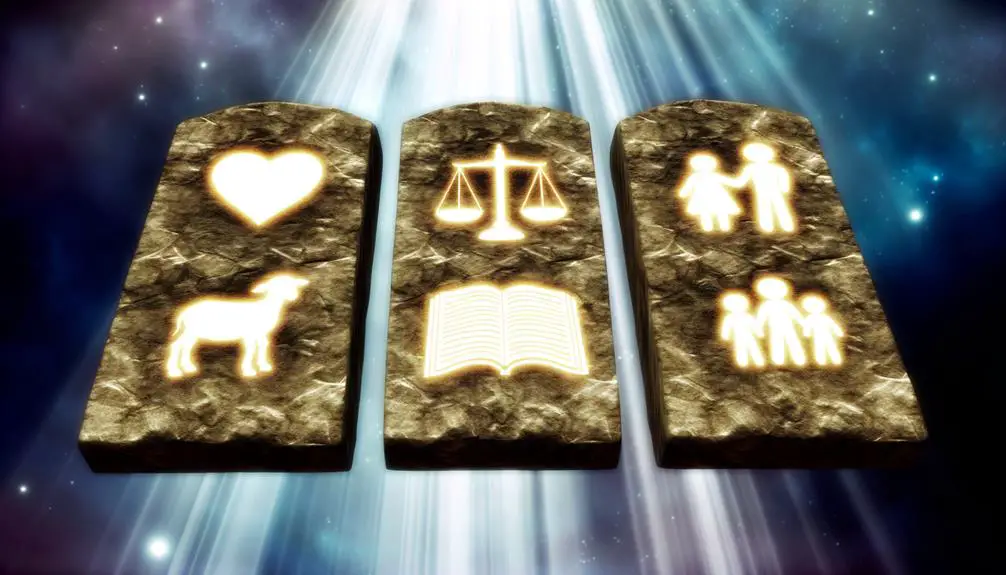Find out how the Bible's ancient moral laws still shape our ethical compass today, and why their timeless wisdom is more relevant than ever.

Moral Law in the Bible
Navigating the moral landscape of the Bible is like embarking on a journey through a vast and ancient terrain, where the Ten Commandments serve as signposts and Jesus' teachings offer a compass. You'll find wisdom etched in the Proverbs and discover how love intertwines with law in the Gospels.
As you explore, Paul's letters provide insights into early Christian ethics, while the Old Testament presents a mosaic of justice. This exploration isn't just about ancient texts; it's about their application in today's world, prompting you to reflect on how these timeless principles can guide modern life.
Curiosity piqued, you'll want to uncover how these moral laws can shape personal and societal values in the contemporary era.
Key Takeaways
- Biblical moral law encompasses commandments and teachings that guide ethical behavior and interpersonal relations.
- Jesus' teachings, including the Sermon on the Mount, emphasize love, empathy, and moral transformation through faith.
- Pauline Ethics extend biblical morality, advocating for a life led by faith, love, grace, and the Holy Spirit's guidance.
- Biblical ethics apply to modern issues, promoting justice, environmental stewardship, and community integrity through principles of restoration and reconciliation.
The Ten Commandments

At the heart of biblical moral law, the Ten Commandments stand as a foundational set of divine instructions, guiding ethical behavior and interpersonal relations. These commandments, delivered to Moses on Mount Sinai, serve not only as a cornerstone for Jewish law but also as a universal blueprint for morality and justice across diverse cultures and epochs. The historical context of these directives is pivotal, deeply rooted in the narrative of the Exodus, where the Israelites' liberation from Egyptian bondage culminates in their covenantal relationship with God. This covenant, marked by the reception of the Ten Commandments, signifies a profound mutual commitment between God and His people, underscoring the commandments' significance beyond mere legalistic adherence.
You're invited to consider the commandments as more than ancient laws; they embody timeless principles that foster societal harmony and personal integrity. The emphasis on monotheism, Sabbath observance, and respect for parents, among others, not only shaped the moral landscape of ancient Israel but also offered a framework for ethical conduct that transcends cultural and historical boundaries. The covenant significance of these laws can't be overstated; they're a testament to a chosen relationship, one that demands fidelity, respect, and love not only towards God but also towards one's community and oneself.
In analyzing the Ten Commandments, you engage with a tradition that's both ancient and exceedingly relevant, offering insights into how ethical principles have been interpreted and reinterpreted throughout history. The commandments stand as a beacon, guiding individuals and communities towards a just and compassionate society.
Jesus' Ethical Teachings

Building on the foundational moral principles established by the Ten Commandments, Jesus' ethical teachings further illuminate the path toward a life of compassion, justice, and love. Central to his teachings is the Sermon on the Mount, a comprehensive discourse that encapsulates the heart of his moral philosophy. Through this sermon, Jesus invites you to transcend the literal observance of the law, urging a deeper, more introspective approach to ethics that emphasizes the purity of heart and intention.
Within the Sermon on the Mount, Jesus introduces several revolutionary concepts that challenge you to rethink your understanding of morality:
- The Beatitudes: These blessings redefine what it means to be fortunate, shifting the focus from worldly success to spiritual virtues such as meekness, mercy, and peace.
- The Golden Rule: 'Do unto others as you'd have them do unto you.' This simple yet profound principle calls for empathy and reciprocity in all human interactions, promoting a universal ethic of respect and kindness.
- Love for Enemies: Perhaps one of the most radical teachings, Jesus commands you to love your enemies and pray for those who persecute you, advocating for a love that transcends personal grievances and societal divisions.
Furthermore, Jesus' parable interpretations serve as vivid illustrations of these ethical teachings, providing concrete examples of how to live out these principles in daily life. Through parables, Jesus not only communicates the essence of his moral vision but also challenges you to engage in reflective and transformative thinking about morality, justice, and the nature of God's kingdom.
Proverbs: Wisdom and Morality

Why does the Book of Proverbs hold such a revered place in the discussion of biblical morality and wisdom? This text, rich in ancient knowledge, offers profound insights into human behavior, guiding readers through the complexities of life with a moral compass rooted in divine understanding. It's in Proverbs that we find a treasure trove of wisdom relating to family dynamics and economic advice, each verse serving as a moral beacon for navigating the challenges of life.
Proverbs speaks directly to the heart of family relationships, emphasizing the importance of respect, discipline, and love. It instructs parents on the upbringing of their children, highlighting the consequences of neglect and the rewards of attentive, moral guidance. This emphasis on family not only strengthens individual character but also weaves a fabric of moral integrity that supports the broader community.
Similarly, the economic advice offered in Proverbs is timeless. It cautions against laziness and promotes diligence, underscoring the moral virtue of hard work. The text advises on financial prudence, warning against the pitfalls of debt and the fleeting nature of ill-gotten gains. It advocates for honesty in transactions, reflecting a deep understanding of the moral implications of economic behavior.
In analyzing Proverbs, we're invited to reflect on these aspects of life not merely as practical advice but as divine wisdom. This book's teachings on family dynamics and economic conduct aren't just guidelines for personal success; they're pillars of a moral framework that elevates the soul, enriches communities, and honors the sacred. In this light, Proverbs stands as a testament to the enduring power of biblical wisdom and morality.
Love and Law in the Gospels

Having explored the profound wisdom of Proverbs on morality and economic behavior, we now turn our attention to the Gospels, where the teachings of Jesus Christ provide a transformative perspective on love and law. The Gospels, through narratives and parables, articulate a profound relationship between divine commandments and the essence of love.
In the heart of Jesus' teachings, you'll find the Sermon on the Mount, which revolutionizes the understanding of moral law by emphasizing attitudes and intentions alongside actions. This discourse reframes the law, not as a series of prohibitions, but as a call to embody the kingdom of heaven through meekness, mercy, and peacemaking.
- The Beatitudes offer a blueprint for Christian character, prioritizing spiritual poverty, meekness, and a hunger for righteousness.
- Parable interpretations, such as the Good Samaritan, challenge conventional boundaries of neighborly love, suggesting that true obedience to God's law involves radical compassion and mercy.
- Jesus' command to love your enemies and pray for those who persecute you underscores the inseparability of love from the Christian understanding of law.
The Gospels' portrayal of Jesus illustrates that adherence to moral law can't be divorced from the love of God and neighbor. This dual commitment is the cornerstone of Jesus' teachings, inviting followers to live in a way that reflects the kingdom of God. In doing so, the Gospels offer not just a set of rules, but a path to transformation through love, challenging you to rethink the essence of morality and legal obedience in light of divine love.
Pauline Ethics

Transitioning to Pauline Ethics, you'll uncover how the Apostle Paul redefines morality through the lens of faith, love, and the grace of Christ. Unlike the strict adherence to the Law observed in the Old Testament, Paul introduces a concept of spiritual freedom that transcends traditional Jewish customs, emphasizing Gentile inclusion in God's salvation plan.
Paul's letters to early Christian communities often discuss how believers are to live in the light of Christ's sacrifice. He argues that faith in Christ has ushered in a new era where the Law is fulfilled through love (Galatians 5:14). This shift doesn't abolish moral standards but rather reinterprets them; love becomes the guiding principle for ethical behavior.
You'll find Paul's emphasis on spiritual freedom particularly striking. He insists that this freedom isn't a license to sin but an opportunity to serve one another in love (Galatians 5:13). This perspective opens the door for Gentile inclusion, breaking down the barriers that ethnic and religious traditions had erected. Paul's vision is of a unified body of believers, Jew and Gentile alike, living out the ethics of the Kingdom of God through the Holy Spirit's guidance.
In essence, Pauline Ethics revolve around the transformation of the believer's moral compass, guided by faith, love, and grace rather than the letter of the Law. This transformative approach encourages a dynamic, inclusive community of believers who pursue moral excellence through the empowering presence of the Holy Spirit, embodying the virtues of Christ in their everyday lives.
Old Testament Justice

While Pauline Ethics emphasize love and spiritual freedom as the basis for moral behavior, the concept of justice in the Old Testament anchors its ethical framework in a rigorous application of the Law, underscoring a divine mandate for righteousness and social equity. You'll find that the fabric of Old Testament justice is woven with threads of communal responsibility, individual accountability, and divine sovereignty, creating a tapestry that demands a detailed examination.
The administration of justice in ancient Israelite society wasn't only a human endeavor but also seen as a divine directive. The concept of *city gates decisions* exemplifies this blend of the divine and the communal. Here, at the city gates, elders would adjudicate disputes and render judgments, ensuring that justice was both accessible and public. This practice underscored the importance of transparency and community involvement in the judicial process.
- *City gates decisions* were pivotal in maintaining social order and were seen as a direct application of God's law.
- The *blood avenger role* highlights the balance between divine justice and human agency. This role allowed for the execution of justice according to God's laws, yet within a framework that prevented endless cycles of vengeance.
- Laws regarding restitution and fairness in transactions reinforced the idea that justice had to be tangible and equitable, aiming to restore harmony within the community.
In essence, Old Testament justice was about more than retribution; it was about restoration and reconciliation, always with an eye towards the collective well-being and faithfulness to God's commandments.
Modern Applications

Often, principles of Old Testament justice find their modern application in contemporary ethical debates and legal frameworks, shaping our understanding of fairness and responsibility in society. You might see the echoes of these ancient norms in the way we approach modern issues like digital ethics and environmental stewardship. These fields, seemingly distant from biblical texts, are deeply infused with the moral law's enduring principles.
Consider digital ethics, which encompasses data privacy, cybersecurity, and the ethical use of technology. Here, the biblical emphasis on honesty, respect for others' property, and the importance of protecting the vulnerable finds a new arena. Similarly, environmental stewardship reflects the biblical call to care for the Earth and its resources, a mandate for responsible and sustainable living that honors creation.
Biblical Principle |
Modern Application |
|---|---|
Honesty and integrity |
Digital ethics in data handling |
Respect for others' property |
Cybersecurity measures |
Protection of the vulnerable |
Ethical AI and technology use |
Care for creation |
Environmental stewardship |
Sustainable living |
Responsible resource management |
You're invited to reflect on how these principles, rooted in ancient wisdom, guide us in navigating the complexities of our modern world. By engaging with these issues through a biblical lens, you're participating in a tradition of ethical reflection that spans millennia, offering insights that remain profoundly relevant today. This sacred heritage, then, not only informs but also enriches our contemporary moral landscape, challenging us to live out these timeless values in our everyday decisions and societal contributions.
Frequently Asked Questions
How Do Non-Canonical Texts, Such as the Apocrypha, Contribute to Our Understanding of Moral Law in Biblical Contexts?
Exploring non-canonical texts like the Apocrypha, you'll find they offer a rich layer of textual diversity that deepens your understanding of ethical frameworks.
These writings, through their Apocryphal influence, don't just expand the narrative landscape; they introduce nuanced perspectives on righteousness and virtue.
In What Ways Do Interpretations of Moral Law in the Bible Differ Among Various Jewish Traditions, Such as Orthodox, Conservative, and Reform Judaism?
Diving into the heart of diverse Jewish traditions reveals a tapestry of interpretations.
You'll find that Orthodox Judaism adheres strictly to Halakhic evolution, viewing both moral and ritual observance as unchanging.
Conservative Judaism, however, embraces a more dynamic interpretation, allowing for adjustments over time.
Reform Judaism takes an even broader approach, prioritizing ethical principles over traditional Halakhic adherence.
Each tradition offers a unique lens through which moral law is understood and applied.
How Have Feminist Theologians Reinterpreted Biblical Moral Laws to Address Issues of Gender Equality and Women's Rights?
Feminist theologians challenge patriarchal interpretations, bringing new perspectives to biblical moral laws.
You'll find they use liberation theology as a tool to advocate for gender equality and women's rights.
They analyze texts, revealing how traditional readings have often marginalized women's voices and experiences.
Through their work, you're encouraged to see the scriptures in a light that promotes inclusivity, ensuring that moral laws support justice and equality for all genders.
Can Parallels Be Drawn Between Biblical Moral Laws and the Ethical Teachings Found in Other Major World Religions, Such as Islam, Hinduism, and Buddhism?
Absolutely, you can find parallels between the ethical teachings in major religions like Islam, Hinduism, and Buddhism when you explore ethical universalism.
Many of these teachings emphasize compassionate acts toward others, mirroring the core principles found in biblical moral laws.
This common ground suggests a shared understanding of what constitutes moral behavior across diverse religious traditions, highlighting the interconnectedness of human values and the universal pursuit of kindness and equity.
How Do Contemporary Ethical Issues, Such as Artificial Intelligence, Genetic Engineering, and Climate Change, Challenge Traditional Interpretations of Moral Law in the Bible?
Navigating today's ethical whirlwind, you're faced with issues like artificial intelligence, genetic engineering, and climate change. These contemporary concerns challenge you to rethink traditional understandings of moral guidance.
You must weave through the complex tapestry of digital ethics and environmental stewardship, seeking harmony between ancient wisdom and modern dilemmas.
This journey demands a scholarly, reverent analysis, encouraging you to bridge the gap between time-honored principles and the pressing questions of our age.
Conclusion
You might argue that ancient texts hold little relevance today. Yet, as you've explored, the moral law in the Bible transcends time, weaving through the Ten Commandments, Jesus' teachings, Proverbs' wisdom, and Pauline ethics.
It's not merely about rules but about living in harmony, guided by love and justice. This ethical tapestry, rich in history and spirituality, offers profound insights for modern life, challenging us to reflect deeply on our actions and their impact on the world around us.



Sign up